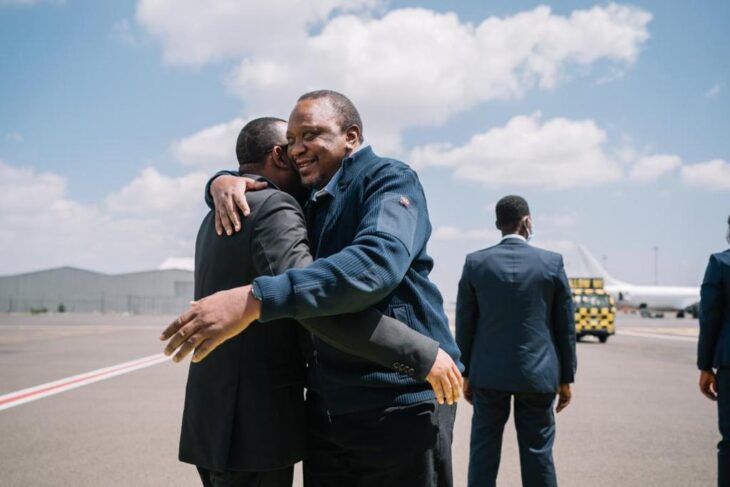NAIROBI, Kenya, Nov 18- The African Union and the International Community have expressed their concerns over the hostilities that it fears are escalating in the Horn of Africa region.
Kenya’s President Uhuru Kenyatta began a full calendar week of talks with international leaders on how best the region and Kenya, in particular, can do its part in trying to quell tensions, especially in Ethiopia.
President Kenyatta, who was in Addis Ababa on Sunday, is expected to meet Yoweri Museveni of Uganda and has since hosted US Secretary of State, Anthony Blinken.
Details of President Kenyatta’s visit to Ethiopia remain classified at the moment, with Nairobi and Addis Ababa only revealing that the meeting between him and President Sahle Work Zewde and Prime Minister Abiy Ahmed Ali was a private one.
“As an anchor state by the US, UK, France are looking up to Kenya to take up more responsibility and initiative to stabilize the region before all these other states collapse one by one,” Dr. Mustafa Ali, who is the chairman of Horn Institute for strategic studies said.
He added that, “an average Kenyan, should worry. Worry a lot, of the possibility of Ethiopia collapsing. This is a country with a population of over 112 million people, if the country collapses today then we will have a deluge of refugees on our doorstep through Moyale, and the porous borders. “
The African Union’s special envoy for the Horn of Africa, Olusegun Obasanjo, remains hopeful that dialogue can end Ethiopia’s year-long war but warned in a Sunday statement that “such talks cannot deliver” without an immediate ceasefire.
The heads state in the IGAD region, are expected in Kampala, to discuss not only hostilities in Ethiopia, but the events further North in the Sudan, the fragile state that South Sudan stands in and the political turmoil in Somalia, as a matter of urgency.
“When Aby came to power, one of the first things he did was reconcile with Eritrea, whose leader Afewerki started the Horn of Africa alliance. The so-called tri-partite initiative, between Eritrea, Somalia and Ethiopia, and the reason behind it was to weaken IGAD. Because Eritrea hasn’t really been in the mainstream of IGAD,” Ali said.
“This is the time for IGAD to take the initiative to ensure that the countries in the IGAD umbrella come together to find solutions to challenges that the region has been facing.”
While Uganda’s President Yoweri Museveni has stepped up in calling for a speedy solution, experts say that key international players are looking at Kenya to step up even more aggressively in guiding her neighbours towards stability.
The trip to Kenya, by US secretary of state, Anthony Blinken, is expected to touch on domestic matters but heavily about the region.
Already, the US has slapped Ethiopia and Eritrea with sanctions and frozen aid to Ethiopia and Sudan over hostilities that have escalated in the last few weeks.
“He was here to basically read the riot act to Somali’s leadership they must conclude their elections before February of 2022. He is also here to encourage the countries in the region to ensure the Eritrea doesn’t continue to play the spoiler role…and supporting the horrendous human rights abuses in Tigray. These are issues that will be put on the table,” Ali added.
The International community is unhappy at the lack of accessibility of humanitarian support to the Tigray region, with both parties being accused of human rights violations.
They hope Kenya will push for a sit down to halt the fighting and reach a solution.
“Children in Tigray are starving and their mothers, dying in their numbers, because of lack of basic supply of food and medicine. This is deliberately done by the state to starve off Tigray. This is unacceptable. international law will not condone this kind of action by a government,” he pointed out.
Ethiopia on Thursday laid out conditions for possible talks with the rebels, including a halt to attacks, a TPLF withdrawal from the neighbouring areas of Amhara and Afar, and recognition of the government’s legitimacy.
The TPLF, in turn, is demanding aid access into Tigray, the region where the conflict erupted last year.
According to the United Nations, no assistance has arrived by road since October 18, and 364 trucks are stuck in Afar awaiting authorization.
Want to send us a story? Contact Shahidi News Tel: +254115512797 (Mobile & WhatsApp)


